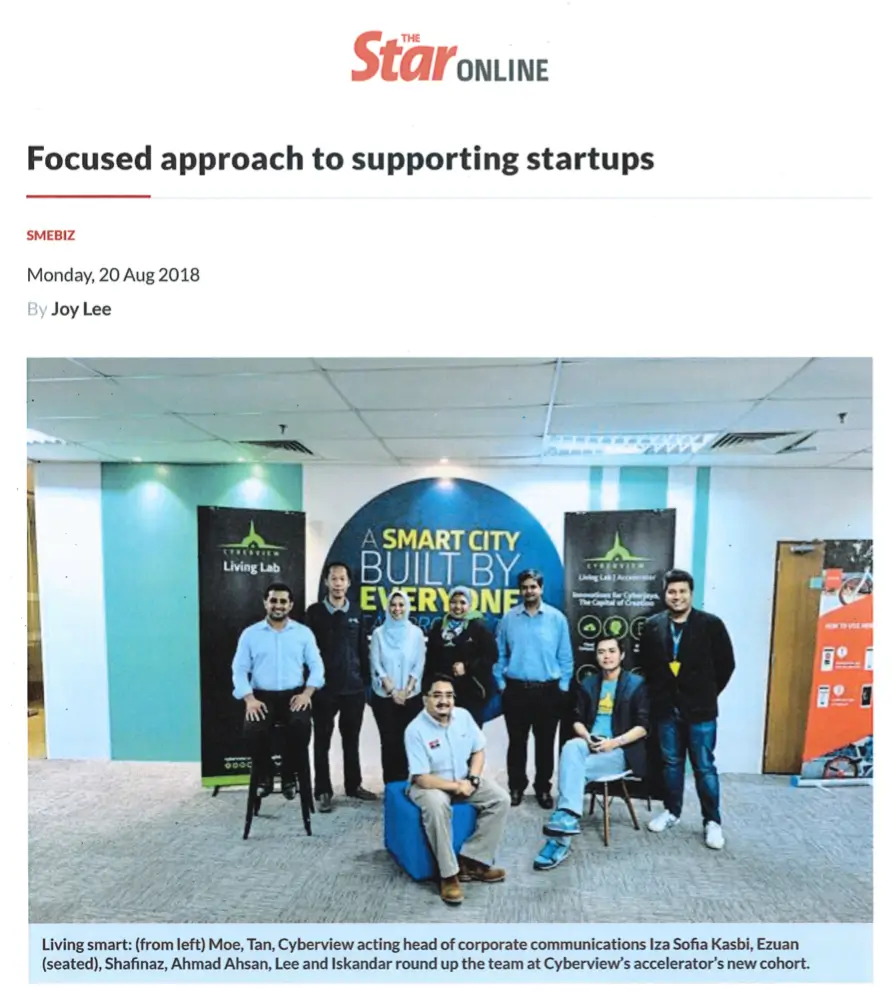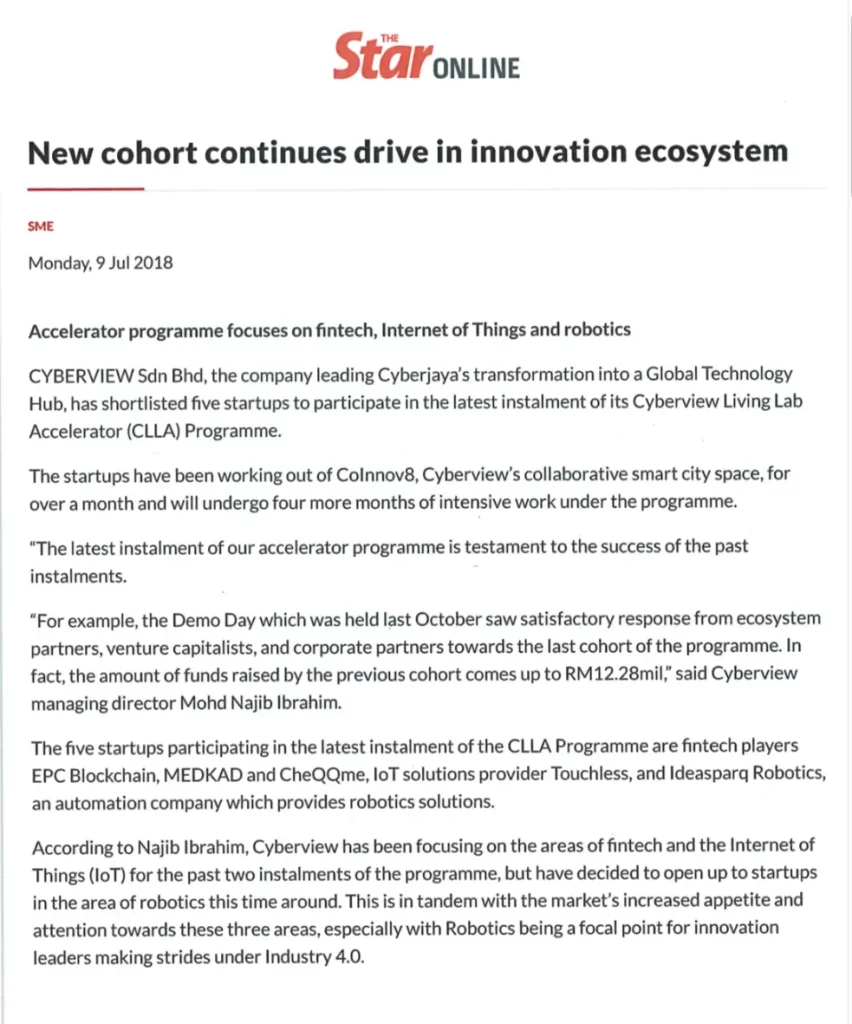

Focused approach to supporting startups
AS CYBERVIEW continues on its smart city plan, it is tweaking its strategy of how it supports tech startups to ensure a better success rate, not just for the startups, but also for the city.
According to Cyberview Sdn Bhd acting head of Technology Hub Development Division Siti Shafinaz Mohd Salim, its accelerator programme has been curating startups that are more matured and are looking for a testbed to pilot their product.
“Previously, we looked at a lot of those in the ideation stage and that requires a lot of handholding. But there are other programmes out there that are already looking at early stage ventures, which (most startups) have gone through. And these programmes would have helped them address issues with their product.
“Here at Cyberview, we are addressing actual problems that we are facing. We want to make sure these companies that we are looking at can immediately solve our problems. If not, they’ll take time. We can’t wait,” she says.
While Cyberview offers these companies the support of an accelerator programme and a conducive environment to pilot their projects, Shafinaz says the startups should also look at Cyberview as a client, or a potential client.
“We want to benefit (from their solutions), too, to meet our internal processes,” she adds.
In its latest cohort for its Living Lab accelerator programme, Cyberview brought in five new startups that fit into its four pillars to building a smart city; infrastructure, automation, economy and environment.
The previous model for the programme was about supplying solutions to the city.
This time around, the startups were also given problem statements so that they’d be able to address specific problems for Cyberview through their solutions.
“Now, we are looking at demand-supply. So we curated the new cohort based on urbanisation problems we are going through. To address these problems, the solutions by the startups can be piloted here first and this can be a reference for them to take it further,” she explains.
While some startups require further refinement to address other clients’ specifications, Shafinaz notes that its cohort has benefitted from their experiences in previous programmes and are more ready to meet immediate needs.
For example, she says Cyberview started engaging one of the startups, smart parking system provider Touchless, while they were still in the ideation stage. But the company has improved on its system since and now makes up part of the latest cohort.
Touchless utilises a combination of hardware and software and Internet of Things (IoT) technology to enable wireless communication between the boomgate and controller in a parking area.
Its founder Moe Aljlal says it is a convenient system for parking operators as it requires minimal installation works and can provide a single parking monitoring and payment system for Integrated developments.
“Right now, integrated developments need separate (parking and payment) systems for the mall, hotel and residents. Ours can cover all of it under one syste m. Also, we enable online management of your account. You can monitor payment in real-time, your account balance, and operators can get a notification if something is wrong in the parking lot. It’s also a very convenient system for users.
“We can add on other things like tailgating notifications, CCTV and security,” he shares.
Touchless is currently working with two parking operators in Petaling Jaya and their services should come onstream within the next few months.
Shafinaz says solutions by companies like Touchless would help automate a lot of low-value functions within Cyberview and boost its efforts to build a global technology hub.
“If they are good, we can see how we can deploy their solution in more of our buildings,” she adds.
Likewise, the other four startups in Living Lab – Medkad, cheQQme, EPC Blockchain and Beebotic- would also enhance the four pillars of Cyberviev’s smart city.
Medkad provides a cost-effective solution for companies to manage and automate their staff’s medical benefits. Chief executive officer Ezuan Yaacob explains that employees will be able to have their details function like a guarantee letter – when visiting panel clinics, which reduces waiting time. At the same time, human resource departments will be able to get real-time information on employees including the type of medication received and whether a medical certificate (MC) was issued. This allows for more transparency, avoid bill manipulation and reduces the need for a third- party manager.
He adds that Medkad is also able to disburse payments to clinics within five days.
“We can tailor the automation to suit the requirements of our customers. We provide the system and we empower and teach the staff how to use it. Our revenue model is based on transactions. We’ve been growing about 48% month-on-month. This year, we want to establish ourselves in the local market. Next year, we want to expand overseas,” says Ezuan.
Medkad currently covers 800 clinics, 46 private hospitals, 181 optical centres and 50 dental clinics in Malaysia. It is serving 56 companies, including one governement agency with 500 staff.
The company will be able to benefit with the upcoming opening of Cyberjaya’s new hospital.
Another company that hopes to pilot its product with the hospital is Beebotic.
Over the past few years, Beebotic has been making ariel guided vehicles (AGV) to help manufacturers with automation. However, it intends to expand into other industries such as hospitals and F&B.
“We want to remove low value jobs in hospitals like movement of food, laundry or waste disposal. Malaysia has a problem with foreign labour and we are replacing jobs where it’s hard to find people anyway,” says Beebotic chief executive officer Ahmad Ahsan,
He hopes to showcase its capabilities at the new hospital and educate the industry on the potential use of AGV.
However, he projects that its growth over the next few years will come from F&B, automated sushi restaurants, in particular.
Meanwhile, EPC Blockchain uses blockchain technology to help customers track their energy consumption for better transparency.
“And based on their energy saving, they can also save on carbon emission. We can help monetise their carbon emission savings by turning it into carbon credits. Our platform aggregates all these small projects to sell them collectively in the international market,” shares EPC chief technology officer Tan Lim Soon Fu.
EPC also enables crowdfunding facility for energy saving projects, which usually find it difficult to get funding through formal channels like banks.
Shafinaz adds that such technology could help Cyberview to further build on its environment pillar and to monetise energy savings.
There’s also cheQQme which uses gamification to help retailers convert online to users to offline traffic.


